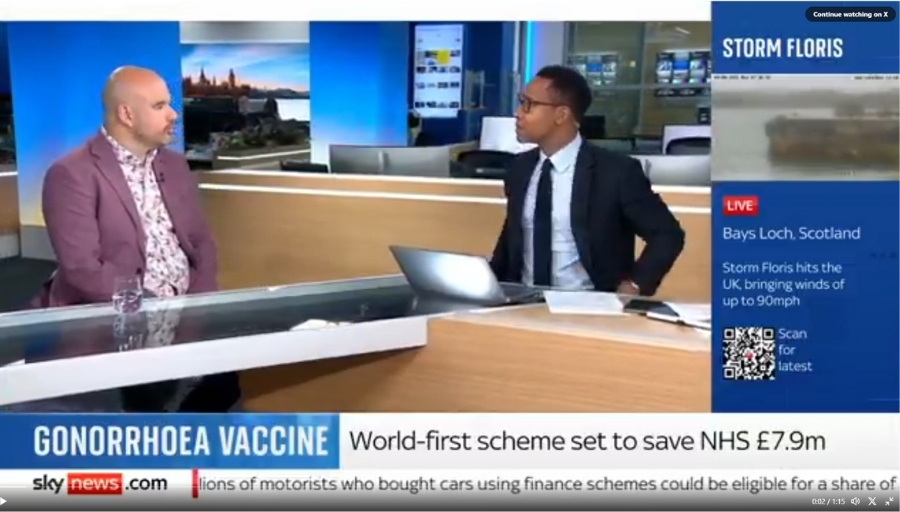A new tool to combat gonorrhoea, finally. The 4cMenB vaccine is now being offered to those with the greatest chance of getting gonorrhoea in the UK, to help turn the tide on rising cases. The UK is the first country to make it available. The programme will be watched closely around the world. With the help of our brilliant supporters, we’ve been pushing for this. Thanks to you, now it’s a reality.
There’s been a worrying trend in gonorrhoea case numbers for many years in the UK.
Back in 2003, around 24,000 people a year were diagnosed with gonorrhoea in England. Two decades on, this had shot up to over 85,000. Elsewhere in the country there were similar rises. In Scotland, cases rose from 821 in 2002 to 5,999 in 2023 and in Wales from 821 in 2003 to 5,292 in 2023. Long-term funding cuts to sexual health services have left the system struggling to respond to demand and prevent new cases.
In November 2023, the Joint Committee on Vaccination and Immunisation (JCVI) took action. They recommended that a vaccine already used to prevent meningitis in children, and proven effective for gonorrhoea, should be offered to those from groups with increased prevalence, as well as the mpox vaccine. This includes gay and bisexual men, trans women and those who have recently had a bacterial STI, such as gonorrhoea, chlamydia or syphilis.
Despite repeated asks, the then government did not make the vaccines available as the JCVI had instructed. With a change in administration last July, there was a chance for another try.
We were the first third-sector organisation to meet with the new public health minister after the election, and we pressed the importance of the gonorrhoea and mpox vaccines and called for action. In September 2024, the government announced a roll-out of the mpox vaccine, which was a good first step, but the campaign for action on the gonorrhoea vaccine went on.
While our private conversations continued, the anniversary of the JCVI recommendation was our chance to go public. As it happens, it coincided with the public health minister flying to the 4th Global High-Level Ministerial Conference on Antimicrobial Resistance. With the British Association of Sexual Health and HIV, we called on the travelling minister to put the 4cMenB vaccine “top of the to-do list”.
Behind the scenes, Professor Chris Whitty and along with officials at the Department of Health and Social Care colleagues were overcoming obstacles and getting ready to make it happen.
Our campaign was gaining traction. In March 2025, we spoke with BBC Newsbeat. Our calls to roll out the vaccine programme were covered across the BBC website and on BBC Radio 1.
On 21 May, it was announced that England would be rolling out the gonorrhoea vaccine from August. Within a month, Scotland, Wales and Northern Ireland had all announced similar programmes.
This month, people are getting their first jabs. It’s making national headlines, which we hope will spread the word that the vaccine is now available.
Watch the Sky News report on X

Sexual health clinics across England are rolling out free vaccines to people most at risk of contracting gonorrhoea.@KamaliMelbourne speaks to @RichardAngell from @THTorguk about the world-first scheme ⬇️ pic.twitter.com/q1H9VbsWkA
— Sky News (@SkyNews) August 4, 2025
This is a huge moment, but the work is not over. Modelling has shown the vaccine could prevent 100,000 cases of gonorrhoea over the next decade, but we need to make sure that uptake is high if we want to see a big impact. If you think you might be eligible, speak to your doctor or nurse at your next sexual health appointment.
The vaccine is a new tool, but it’s not the only one. We’ll keep up the pressure to ensure that sexual health services are properly funded to ensure they’re fit for the future.
Only with your support can we continue that work. Help us continue to make history by donating today.

